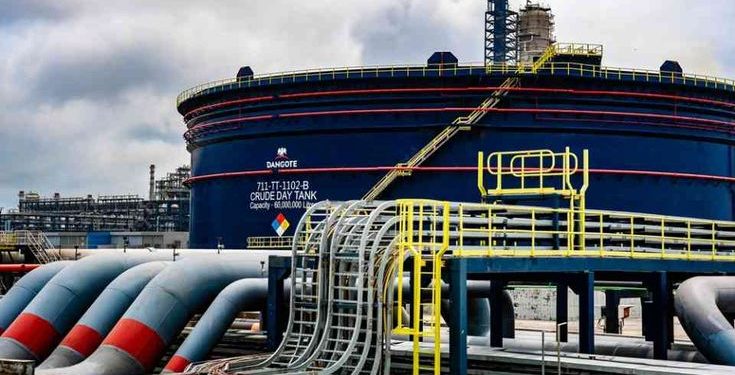The Dangote Petroleum Refinery has announced the commencement of free nationwide distribution of refined petroleum products, including Premium Motor Spirit (PMS), diesel, and Jet A1 fuel. This initiative, hailed as a strategic move to ease economic pressures and support national development, is tied closely to the federal government’s Naira-for-Crude initiative and other presidential economic recovery programs.
The refinery’s management attributed the milestone to President Bola Ahmed Tinubu’s “Nigeria First” policy, the Presidential Compressed Natural Gas (CNG) Initiative, and broader reforms under the administration aimed at deepening energy security and economic independence.
A Bold National Intervention
Described as a “quantifiable massive benefit to all Nigerians,” the Dangote Group has begun absorbing logistics and capital costs traditionally passed on to consumers a gesture that effectively ploughs back the refinery’s commercial success into the economy.
Some key figures shared by the company underscore the sheer scale of the impact:
- ₦1.07 trillion in annual logistics costs to be borne directly by the refinery
- ₦720 billion in additional capital expenditure for 4,000 CNG-powered trucks and a national CNG distribution network
- ₦1.7 trillion in gross annual savings to Nigerians across the fuel value chain
- 65 million litres in daily consumption capacity covering PMS, diesel, and Jet A1 products
This move is expected to drastically reduce fuel-related economic burdens on consumers, transporters, manufacturers, and service providers nationwide.
Before the Refinery Revolution: A Recap of the Crisis
The Dangote Refinery also released a breakdown of the systemic inefficiencies Nigerians faced before this intervention:
- Perennial fuel scarcity and long queues at stations
- Widespread adulteration of fuel damaging engines and equipment
- Differential pricing between regions due to poor logistics and middlemen
- Exorbitant bridging costs borne by the government
- Soaring inflation at 33%, partially driven by energy prices
- Weak GDP growth (2%) linked to energy sector inefficiencies
- Heavy fiscal drain through the Petroleum Equalisation Fund (PEF)
- Rampant fuel smuggling and subsidy abuse, costing billions
- Redundancy of fuel stations due to unpredictable supply
- Massive environmental pollution due to substandard fuel and logistics
- High energy costs for logistics, manufacturers, and households
- Widespread job losses and industrial shutdowns
These challenges collectively cost the economy an estimated 2% of GDP, equating to over $6 billion annually in losses.
Dangote’s Strategic Investment
To combat these issues, Dangote Group has not only established the world’s largest single-train refinery in Lagos but is also deploying a robust CNG-powered logistics fleet, expanding Nigeria’s CNG distribution infrastructure through “mother and daughter” stations across the country.
The group emphasized that these strategic investments are aligned with the vision of energy security, economic revival, and industrialization, as envisioned by President Tinubu.
A New Era for Nigeria’s Petroleum Industry
With this unprecedented move, Nigeria is now poised to become self-reliant in refined petroleum products, with the added benefit of saving foreign exchange, creating thousands of jobs, reducing inflation, and promoting environmental sustainability.
The free distribution phase is expected to be temporary but impactful, aimed at stabilizing the market and creating a benchmark for pricing transparency and efficiency going forward.
Analysts say this move may soon redefine the fuel subsidy debate, as market-driven solutions backed by domestic refining capacity begin to yield real results for the Nigerian people.





















































